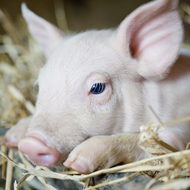Gene-editing used to tackle deadly virus

While farmed pigs quickly become ill and die from this disease, infected warthogs and bush pigs show no signs of disease.
Edinburgh scientists have used a gene-editing technique to produce pigs that are potentially resilient to African swine fever (ASF), a highly contagious and often deadly disease.
The new pigs have variants of a gene found in warthogs and bush pigs, which are not affected by ASF. A team from the University of Edinburgh's Roslin Institute believe this could stop them becoming ill from the disease.
ASF is spread by ticks and kills up to two thirds of infected animals. It is endemic in Sub-Saharan Africa and some parts of Russia. While it has never been found in the UK, recent outbreaks in Eastern Europe have raised concerns among farmers that it could spread.
While farmed pigs quickly become ill and die from this disease, infected warthogs and bush pigs show no signs of disease. This is thought to be because they carry a different version of the RELA gene, which in farmed pigs causes the immune system to overreact with devastating consequences.
Researchers used advanced genetic techniques to change five letters in the RELA gene, converting it into the allele that is found in the warthog. It is the first time scientists have successfully used gene editing to swap alleles in an animal's genetic code.
Controlled trials will now be carried out to find out if altering the genetic code has improved the pigs' resilience to ASF. The team believe it will dampen their immune response and help to explain why warthogs are more resilient.
The study has been published in the journal Scientific Reports: http://www.nature.com/articles/srep21645



 FIVP has shared a survey, inviting those working in independent practice to share their views on the CMA's proposed remedies.
FIVP has shared a survey, inviting those working in independent practice to share their views on the CMA's proposed remedies.